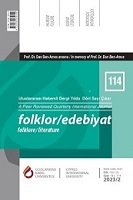Betül Tarıman’ın Şiirinde Vahşi Kadının Yeniden Doğuşu
The Rebirth of the Wild Woman in Betül Tarıman’s Poetry
Author(s): Mihrican AylançSubject(s): Gender Studies, Turkish Literature, Psychoanalysis, Sociology of Culture, Theory of Literature, Sociology of Literature
Published by: Uluslararası Kıbrıs Üniversitesi
Keywords: wild woman archetype; psychoanalysis; "Handless Maiden"; initiation; poetry; modern woman hero myth;
Summary/Abstract: In Women Who Run with Wolves, Clarissa Pinkola Estes goes after the ‘creative, talented, and immersed woman symbol’ which has been ignored by psychoanalysis for a long time, where she chases the pure reality of women whose internal nature has been damaged, whose souls have been tossed to the most pathetic lands, and who have taken on unnatural rhythms over their natural cycles just to please others. While women continue to instinctively share archetypes, Betül Tarıman, who displays an internal womanhood stance in the Anatolian geography, raises the mythical era narrative voices for us women, from her work Hadde, that is sensitive to her emotions, conscious, and tactile pleasures, and creatively transforms them into modern poetry. As Estes breaks the silence regarding issues surrounding her style, knowledge, and creative fire for women’s different eras, which can be defined as archetypical, intuitive, sexual, and cyclic. With this analysis, which follows in the footsteps of the wild woman archetype, added to the literature by Estes, I added poetry to the existing myths and fairy tales. I emphasize that poetry can too be just as long lasting as they are while being an enunciation leading to wisdom. This archetypical perspective, like mythical stories, poetry sets forth the sharp realization that can help conceptualize our visual power to see nature’s naiveté. Betül Tarıman, a woman who found her voice in nature, is a wild spirit. She moves forward in an alchemical cycle of loss, disjunction, and enlightenment during her journey that ends with wisdom. She awakens in a sacred location in eternity, independent of time and place, created by poetic language and word. This way, she creates the myth of the modern woman hero. By connecting with the wild woman archetype, she transforms into an eternal inner voice, calling out to women in search of themselves during their journey of initiation.
Journal: Folklor/Edebiyat
- Issue Year: 29/2023
- Issue No: 114
- Page Range: 407-438
- Page Count: 31
- Language: Turkish

